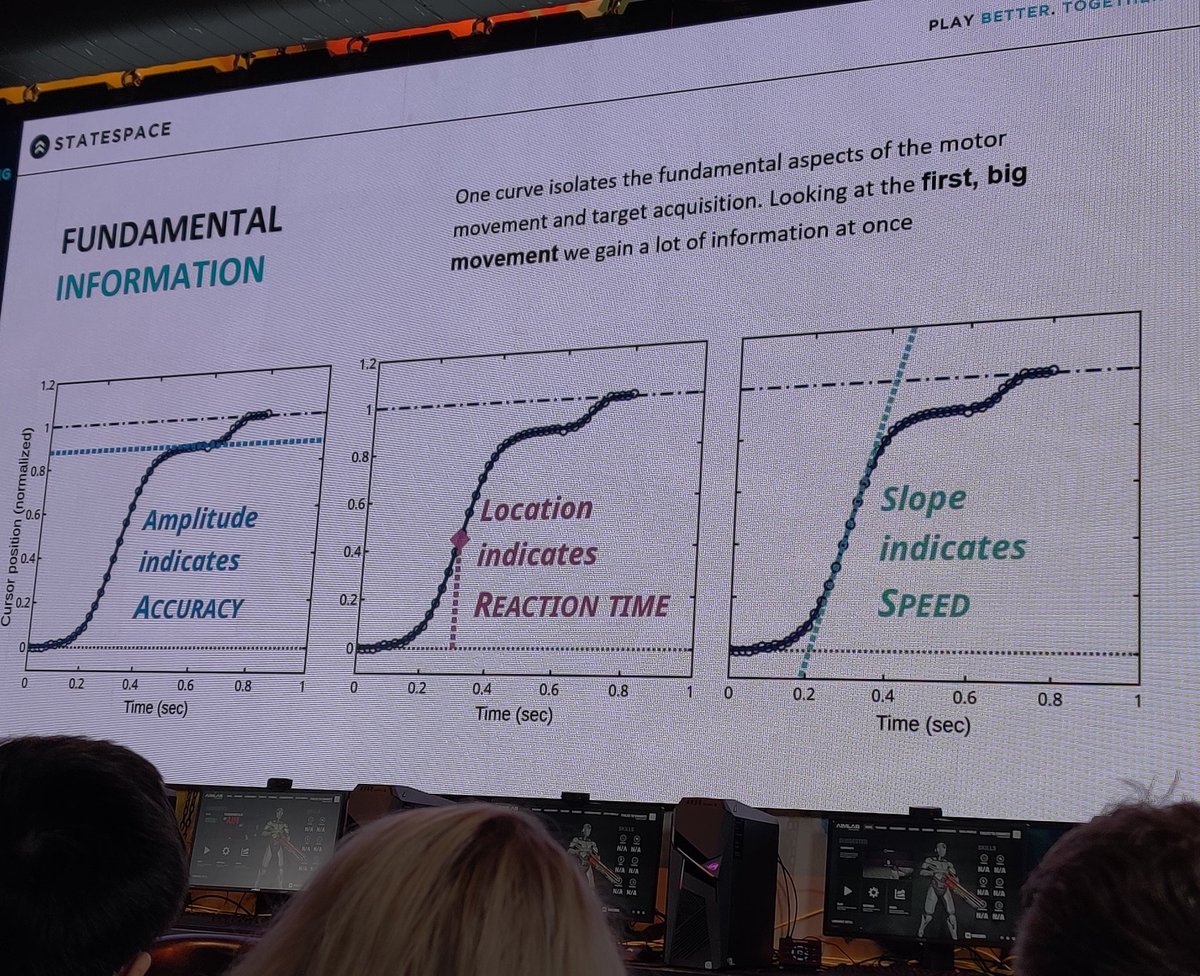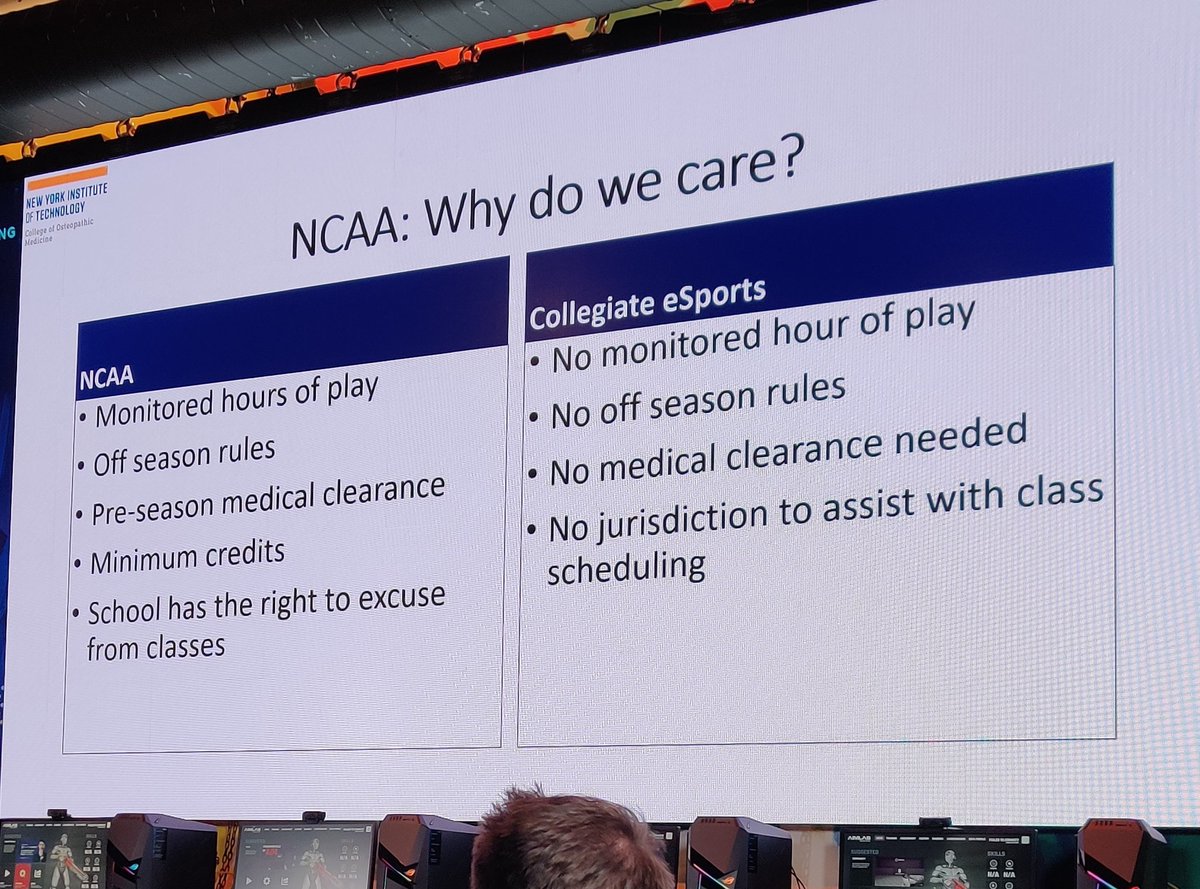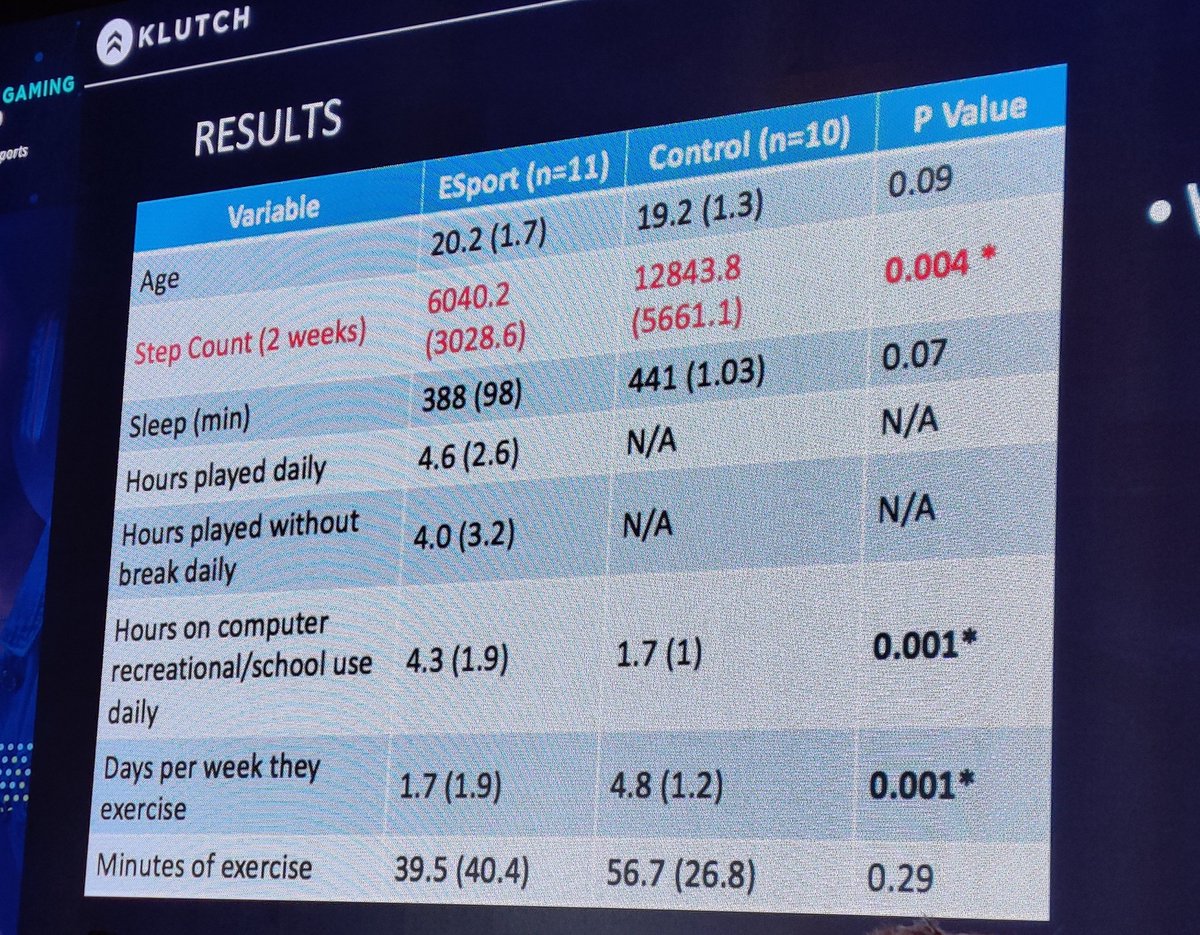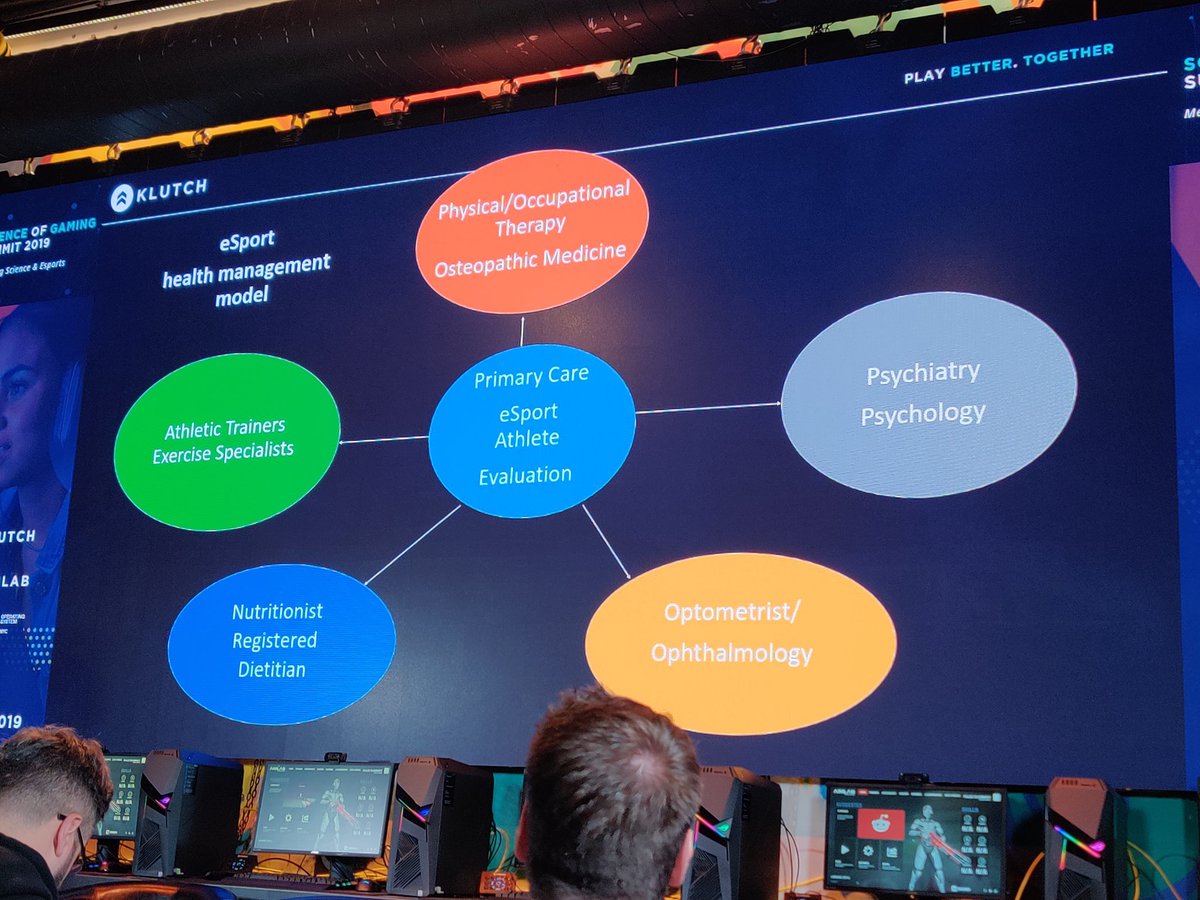Going to be tweeting a bit about the Science of Gaming Summit today. With the exception of when I present, I& #39;ll keep it all in this thread #SOGS19
Starting off with a panel on Building a Team/Organization with @eUnited, @clgaming, and @compLexity
Starting off with a panel on Building a Team/Organization with @eUnited, @clgaming, and @compLexity
All emphasized the importance of team fit, not just individual skill, when recruiting players.
Great discussion on burnout--social health is as important as physical, emotional, and mental health. CoL also mentions the importance of microgoals. #SOGS19
Great discussion on burnout--social health is as important as physical, emotional, and mental health. CoL also mentions the importance of microgoals. #SOGS19
Re: microgoals: "It& #39;s a mistake to use win/loss as your sole metric of improvement in games, scrims, practices. Did you improve in a particular metric even if you lost?" E.g. aim, strategy, communication, resilience, fatigue. I& #39;m reminded of this: https://twitter.com/CaitMcGeePT/status/1197665493190168576?s=19">https://twitter.com/CaitMcGee...
Next up: Training for Cognitive and Physical Performance at the Highest Level with @LogitechG, Liminal Collective, and @parthenaan.
Two key components: how do we accomplish/think about what& #39;s never been done? How do keep this elite performance modem centered on PEOPLE?
Two key components: how do we accomplish/think about what& #39;s never been done? How do keep this elite performance modem centered on PEOPLE?
70/20/10 rule:
70% of performance relies on science proven for success--adequate sleep, appropriate training structure, good nutrition, consistent movement.
There& #39;s no silver bullet to make up for deficits in that 70%.
70% of performance relies on science proven for success--adequate sleep, appropriate training structure, good nutrition, consistent movement.
There& #39;s no silver bullet to make up for deficits in that 70%.
20%: Once you have that base, the next component of advancing performance is drawing on novel sources and ideas. Can we draw from entertainment professionals line Cirque du Soleil? Cognitive endurance professionals like air traffic controllers?
10%: The Moonshot. What are the things that nobody else is doing that you& #39;re willing and able to try?
(Note: a lot of teams and orgs seem to think of healthy behaviors like regular exercise, nutrition, mental toughness training, good sleep hygiene, etc. as part of the 20/10%. Those behaviors are ABSOLUTELY 70% things. Science shows they& #39;re key to performance)
TSM: Putting players outside of their comfort zone can result in them being more open to new ideas--as long as they get some benefit out of or feel accomplished for what they did outside of their comfort zone (e.g. TSM players learning they could hold their breath for 2 mins)
(Note: this will only result in lasting change if there& #39;s continued, consistent reinforcement, not one-time pushes)
Really good q: How do you convince players that these non-traditional things are more beneficial than just grinding?
A: education/encouragement from support staff that they trust, give them the data/research, experiential learning, promoting self-awareness
A: education/encouragement from support staff that they trust, give them the data/research, experiential learning, promoting self-awareness
Let players see the data for themselves. E.g. TSM gave players sleep trackers, then showed them the data on their sleep habits and how it correlated with performance the next day.
Next up: The Science of Gaming
One of the biggest deficits in esports vs traditional is that there are no standardized benchmarks for esports performance. We don& #39;t have as much data on what amount/type of training is best, how much is too much.
One of the biggest deficits in esports vs traditional is that there are no standardized benchmarks for esports performance. We don& #39;t have as much data on what amount/type of training is best, how much is too much.
Neuroscience research requires objective measures of performance that can be replicated and compared. This translates well to gaming/esports research.
One example: we can develop a "retinal performance field" that maps our perception of an object using repeated eye gaze tests. Our ability to perceived an object is significant affected by where something hits our retina.
Typically, a successful shot (moving from one position to shoot a target elsewhere consists of two movements: one big movement to get there, one small corrective movement to land it.
Next topic: Current Research for Health and Injury in Gaming and Esports
There& #39;s a huge misperception by the mainstream medical community of gaming and esports. There& #39;s no point in asking "are these real sports and athletes"; they are individuals with specific health concerns.
There& #39;s a huge misperception by the mainstream medical community of gaming and esports. There& #39;s no point in asking "are these real sports and athletes"; they are individuals with specific health concerns.
There& #39;s almost no research on esports and gaming. Traditional sports have years of research to inform policy, planning, and best practices.
NCAA and IOC rejected esports as "sports" in part because of a lack of research about the gaming sphere.
Most common issue reported by collegiate esports players: digital eye strain. Most of them didn& #39;t think of it as an actual medical issue; they just thought it was part of playing.
(Note: we see this with physical pain as well)
And yes, a lot of what our research shows--neck pain, wrist pain, eye strain--are things that anyone in esports already knows are problems. But until we put it down on paper, in research, it doesn& #39;t exist for the broader community and we can& #39;t do anything to change it.
Esports athletes also had significantly less lean muscle. Without lean muscle mass, you are at MUCH higher risk of overuse injuries and will have worse focus/attention.
It takes 60-75 minutes to negate the negative effects of prolonged sitting, but you can get similar effects by taking regular (short) breaks rather than sitting for hours.
"There& #39;s no science that Gfuel makes you better, smarter, faster. It& #39;s all hearsay. There& #39;s no science behind it."
Really good question: is there any difference in physical problems when you stratify risk by skill level? Needs researching.
Next up: How Can Aspiring Pro Players Train?
with @officialvalkia, @KingGeorge, and @omgitspotter
First: you have to treat streaming and training as a business. It can& #39;t just be about having fun.
with @officialvalkia, @KingGeorge, and @omgitspotter
First: you have to treat streaming and training as a business. It can& #39;t just be about having fun.
King George recommends giving yourself a timeline to failure--give it 110% for some period of time, but recognize that if it doesn& #39;t work out by x point you need to make sure you& #39;re financially secure.
Potter: I wish I& #39;d learned time management and prioritization better. I would have been better off setting microgoals, small things to progress with.
Potter: a lot of pro players are where they are because they fell into it. There& #39;s a lack of specificity and intention to get to that level, and we could learn a lot from pro traditional sports athletes in that regard.
Valkia: there are people who watch you for what/how you play, and there are people who watch you for your personality. The latter group are the kind you really want, because they& #39;ll enjoy watching you play anything you enjoy playing.
Potter: "There aren& #39;t that many pros. There aren& #39;t really that many talented gamers." You NEED self-awareness, a recognition of where you are and what your chances are to make it as a pro.
KG: Don& #39;t put everything in your life on hold until you can see a realistic path forward and you actually get some traction.
(Unsurprisingly, I did not livetweet my own panel. I& #39;ll post a link to the video of our panel once up! On to "Talent ID, Recruitment, & Team Composition")
First off: one of the big issues right now is a lot of stats are hand-tracked, and not all publishers give access to API
First off: one of the big issues right now is a lot of stats are hand-tracked, and not all publishers give access to API
Amazingly, not everybody in the world loves stats (whaaaaaaat???). Having someone who& #39;s both interested and able to interpret into something meaningful is important.
Data visualization makes players slightly more interested. Make it interesting, colorful, interactive, easy-to-understand.
When considering team dynamics: @NRGgg& #39;s GoW team found success by building brotherhood. Being able to talk to each other bluntly/harshly, with the underlying trust that you actually care about each other, like brothers might. V different from how you might talk to a co-worker.
Team fit is essential--players have to buy into the same mindset and each other.
"Super teams" don& #39;t last because your technical skill only matters so much--if the players can& #39;t put their egos aside, can& #39;t mesh as a team, their individual skill means nothing.
Great question: how do you build team chemistry when it isn& #39;t there?
A: team building exercises really do help, but it& #39;s hard to convince players to do them
A: players becoming friends outside the game can help them be less sensitive to criticism from each other
A: team building exercises really do help, but it& #39;s hard to convince players to do them
A: players becoming friends outside the game can help them be less sensitive to criticism from each other
Q: How do players train for emotional regulation?
A: Give them communication skills, facilitate communication/let them feel comfortable talking, use physical methods like yoga and meditation that train you to calm your mind, get them to disconnect and have fun. Balance.
A: Give them communication skills, facilitate communication/let them feel comfortable talking, use physical methods like yoga and meditation that train you to calm your mind, get them to disconnect and have fun. Balance.
Next topic: Nutritional and Physiologic Needs for Optimal Performance and Player Longevity, with Dr. Hector Lopez and @CoachT_Johnson
(I& #39;m super excited for this one!)
(I& #39;m super excited for this one!)
Load management: there are optimal ranges of stress (eustress). Below that range, performance declines due to boredom; above that range (distress) performance declines due to anxiety, burnout, frustration.
Any time the body senses stress, it kicks off cascading pathways in the hypothalamus/pituitary gland which, if left unchecked, negatively impact lots of organ systems (increased HR, impaired sleep, decreased nutrient absorption, increases blood sugar, etc.)
(note: that& #39;s not to say we should avoid all stress. Exercise, for example, is a "stressor" in that it disrupts homeostasis--but it also trains our body to regulate and de-escalate those cascades)
Ideal diet: half your plate should be plant-based (fruits and veggies). The other half (complex carbs and protein) can vary, depending on individual goals, stresses, biology.
A lot of currently on-the-market products throw all of the possibly-useful ingredients into a "proprietary blend" where you never know how much of each ingredient there is or if it& #39;s in the quantities that research shows a benefit from.
A lot of products have been tested on individuals who have cognitive impairment or illness/injury. Benefits in those populations MAY carry over into our gaming populations, but they haven& #39;t been tested much in gaming yet.
After 5-7 days of consuming caffeine at a particular dose, you become habituated and NEED that dosage just to get to your performance baseline. However, acutely, it can boost simple reaction time and visual attention (but may also increase your error rate).
Last panel of the day: Adaptive Athletes - If You Have a Body, You Can Game with @emustonfirsch, Dr. David Patrino, and @the_quadgods.
Erin helped design the Xbox adaptive controller!
Erin helped design the Xbox adaptive controller!
We surround our high-performance athletes with a team that makes everything specific and engaging and interesting. They continue making gains. How do we make that financially viable and successful for all of our rehab patients?
Direct therapy isn& #39;t always the best therapy. The same way that "non-optimal" exercise done consistently is better than none, indirect rehab exercises (like gaming) are better than not doing/not wanting to do direct therapy.
Cognitive, emotional, and social benefits to being on a team, competing, feeling a sense of belonging and purpose.
Blake: "I kick ass in Black Ops. People online don& #39;t know I& #39;m disabled unless I tell them. So for everybody watching: told you so."
When it comes to adaptation: look at the mechanics of the task, look at the ability of the person, and find the right fit.
1 in 5 Americans has a motor disability of some kind. If we& #39;re not making adaptive and assistive technology mass marketable and widely available, we are failing 20% of our neighbors.
Accessibility isn& #39;t just about improving your physical ability. It lets you belong, contribute, participate; it& #39;s about social and emotional health, too.
Blake: People only change the way they game when they encounter a problem they can& #39;t solve.
Well, 8 hours later "a bit" has turned into "a lot", but this Summit was too full of incredibly useful knowledge to not share as much as possible. Hope anyone who turned in found it as valuable as I did! /fin

 Read on Twitter
Read on Twitter





